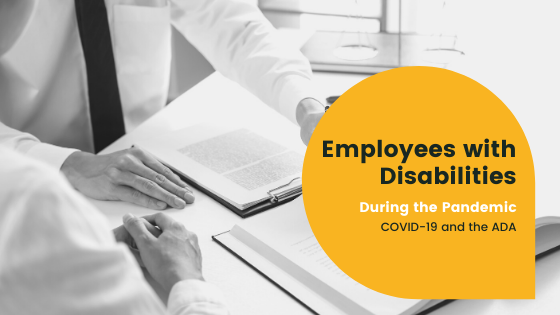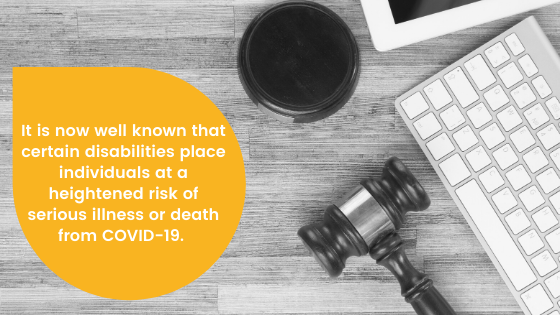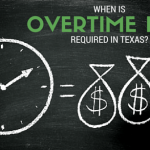Employees with disabilities have long known that they are protected under the Americans with Disabilities Act (ADA), including the requirement that employers provide reasonable accommodations. However, during these previously unforeseen times, there have been a lot of questions about how the ADA applies to employees with disabilities during the pandemic, what rights to accommodations employees with disabilities have, and have employer obligations under the ADA changed at all. While this post is meant to provide employees with general guidance on these issues, do not wait to contact an employment attorney in your area if you believe that your rights have been (or continue to be) violated by your employer.
Requests for Reasonable Accommodations during the Pandemic
The requirement that employers provide employees with reasonable accommodations under the ADA has not changed due to the pandemic. Reasonable accommodations may include any adjustment or modification of job duties that enable an employee with a disability to perform the essential functions of his/her job, so long as the accommodation does not create undue hardship for the employer.
It is now well known that certain disabilities place individuals at a heightened risk of serious illness or death from COVID-19. Because of this, employees who suffer from one of these disabilities may need to request a reasonable accommodation to protect themselves from exposure. While this is not an exhaustive list, reasonable accommodations could include
- telework
- modified job assignments
- temporary transfer to a different position,
- modified work schedule
- using physical barriers
- a change in office space to reduce the chance of exposure
Ultimately, as was the case before the pandemic, if an employee believes that he/she needs an accommodation to perform the job, the employee needs to notify the employer and submit the request. An employee and employer must engage in what is called the ‘interactive process’ to figure out what, if any, reasonable accommodations may be appropriate.
Employees’ Right to Privacy
Under the ADA, employers are required to keep employees’ medical information confidential (i.e. store separately from the employee’s personnel file). However, this has been somewhat complicated by the pandemic. For example, what does a supervisor do if he/she discovers that an employee has tested positive for COVID-19? While the supervisor is obligated to keep this medical information confidential, the supervisor is not prevented from reporting the information to the appropriate designated individual (oftentimes HR) so that the company can take proper steps to protect other employees. The ADA also does not prevent an employer from asking the positive employee about who they have come into contact with at work so that the employer can notify those individuals that they may have been in contact with someone who tested positive (without disclosing the identity of the positive employee).
Know Your Rights
Know your rights, stand up for yourself, and get the advice and representation that you need. If you have a disability and need an accommodation (related to the pandemic or otherwise), it is always important that you advocate for yourself. If your employer is not respecting your rights and following the law, speak to an employment attorney who can advocate for you. If you have been fired because of your disability or request for reasonable accommodation, it is imperative that you contact an employment attorney who can pursue any available legal claim and remedies on your behalf.









